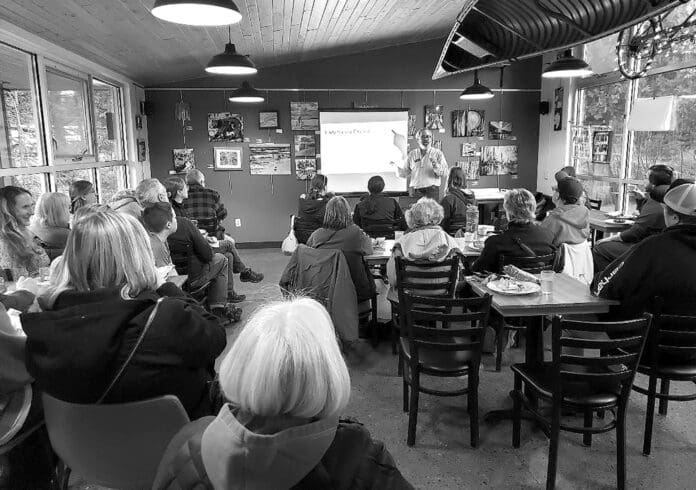In the first of six meetings to occur around the area, Two Harbor’s Cedar Coffee Co. filled up with over thirty community members eager to talk about the challenges and opportunities regarding boosting recycling and composting in the area.
A large looming issue over consumer and commercial waste is on the horizon. Moccasin Mike Landfill, located in Superior, WI, is slated to reach capacity in 2026. Moccasin Mike’s is where the majority of our northern waste travels. “This is going to change things,” said David Abazs, the facilitator at the Northeast Communities Recycling and Composting Collaborative meeting. “You can’t just open a new landfill. A lot will have to happen.”
Abazs works for the University of Minnesota Extension. Lake County Environmental Services Director Christine McCarthy worked with Abazs and his team to earn a grant from the Minnesota Pollution Control Agency to increase recycling and composting in Lake and Cook counties along with Grand Portage. Part of the funding is aimed at feasibility study.
“We’re working with staff from the U of M to really get an understanding of what the current knowledge is, the current attitude, the current infrastructure that we have and a baseline for understanding where the money is best spent,” said McCarthy.
Part of that baseline has been collected from a community survey that was conducted over recent months regarding both residential and commercial waste. Abazs shared that many respondents reported that they were composting. Most are recycling and want to recycle more.
The meetings, which will also occur in Grand Marais, Tofte, Finland, Silver Bay, and Grand Portage, will be critical to augment the survey. They are a chance to both educate and discuss ideas and barriers. “The main goal is to reduce our overall materials that go to landfills,” said McCarthy, who lives in Two Harbors and has been in her role since 2015. Before that time, she worked in the private sector for twenty-six years, including working for an environmental consulting firm in Duluth.
Reducing waste is entirely possible, considering that an average of fifty percent per weight of household waste is organic material. Composting has obvious benefits. “Composting is the life and blood of soil,” said Abazs, who went on to speak to soil health, soil erosion, reduction of methane in a landfill, and how compost promotes healthier growth for plants. But it can be difficult to participate, depending on the circumstances.
Broken into groups, attendees were challenged to think of barriers for composting and recycling. In the city limits, not everyone has a yard or place to use the compost. In rural areas, bears and vermin can make a mess of things. My dogs are guilty of getting into that stinky stuff! Recycling challenges brought up were that it is sometimes confusing what can be recycled and how. An employee of the recycling center advised that people drop off non-recyclables all the time. Others reported that local recycling pick up wasn’t frequent enough for their needs, meaning storage was an issue that many might face.
The groups were further challenged to brainstorm ideas to improve recycling and compost efforts. One ever-present response was education and growing community awareness. “I think the interest will grow as people recognize the issues and likely increased costs for their waste disposal,” Abazs said. “It’s beginning.”
It was a smart crowd that had a lot of ideas including drop off sites, incentives for composting, and reducing food waste. I had the good fortune to be at a table with a young high school student who had really great ideas. In fact, I may have raised her hand to share with everyone what she had come up with. Her ideas were so impressive that she was asked to read all of them, which makes me a bit more hopeful for the future.
“The ideas are great. There are some really big ideas and really small ones, and it is going to take a combination of those ideas and solutions to solve this problem,” Abazs said.
During the discussion, I learned about so many interesting things. Someone mentioned a fungi that eats Styrofoam. I learned about soldier flies and have subsequently binged some YouTube videos about them to learn more. I learned it is illegal in Vermont to throw food scraps in the garbage. I also learned about recycling brokers and how dependent recycling options are on what they are in the market to buy.
Abazs and his team will pull together what they’ve learned from the survey and the meetings and develop step by step plans that they will bring back to the community. “Then we can look for some funding and see what we can find out there. With the new federal funds and some of the state funds there might be some opportunity to implement some of these ideas,” he said.
Abazs was pleased with the turnout at Cedar Coffee Co. “Hopefully this will be the beginning of looking at solutions on what we can do with our waste going forward,” he explained. “This is something we can do for ourselves, our children, our community, and the environment around us. It’s a win-win-win.”




